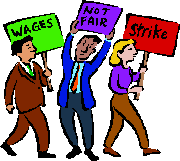CLUW demands end to war in Iraq
 |
The convention also passed strongly worded resolutions for single-payer health care, justice for immigrant workers, and promotion of more women and people of color to leadership of the labor movement.
The peace resolution called for “immediate and complete withdrawal of all American troops and private contractors from Iraq,” no permanent bases in Iraq and full war reparations to rebuild the Iraqi infrastructure. It also called for Iraqi sovereignty over Iraqi oil and “the highest quality health care, rehabilitation and other needed benefits” for returning U.S. veterans.
Resolutions were also passed to support the Employee Free Choice Act, the Fair Pay Restoration Act, paid parental leave, gay marriage rights, fair international trade and the celebration of May Day.
The convention was a lively four days, with labor songs and snake dancing marking the beginning and end of every plenary session and the gala reception on the last evening.
A highlight of the convention was a presentation by Rep. John Conyers (D-Mich.), chief sponsor of HR 676, the national single-payer health care bill, and chair of the House Judiciary Committee.
“Everybody in, nobody out,” was Conyers’ slogan. He said that every industrial country in the world but ours enjoys health care for all. Delegates jumped to their feet, chanting, “Everybody in, nobody out!” in support of the legislation.
Conyers also announced that the House Judiciary Committee would be holding hearings on the Jena Six.
A panel of speakers from AFL-CIO constituency groups — the A. Phillip Randolph Institute, the Coalition of Black Trade Unionists, the Asian Pacific American Labor Association, Pride at Work and CLUW — discussed the need to advance diversity at all leadership levels of the labor movement. “Male, pale and stale” is the way they characterized many leading bodies. For the labor movement to grow, they stressed, leaders should “look like their memberships and face the same issues.”
An inspiring talk by Linda Chavez-Thompson reminded delegates of the challenge of the coming 2008 elections. Chavez-Thompson recently retired as AFL-CIO executive vice president. Arlene Holt-Baker, the new AFL-CIO executive vice president, also spoke about the coming presidential elections. She is the first African American to hold the second highest post in the AFL-CIO.
The resolutions adopted at the convention can be found here.

